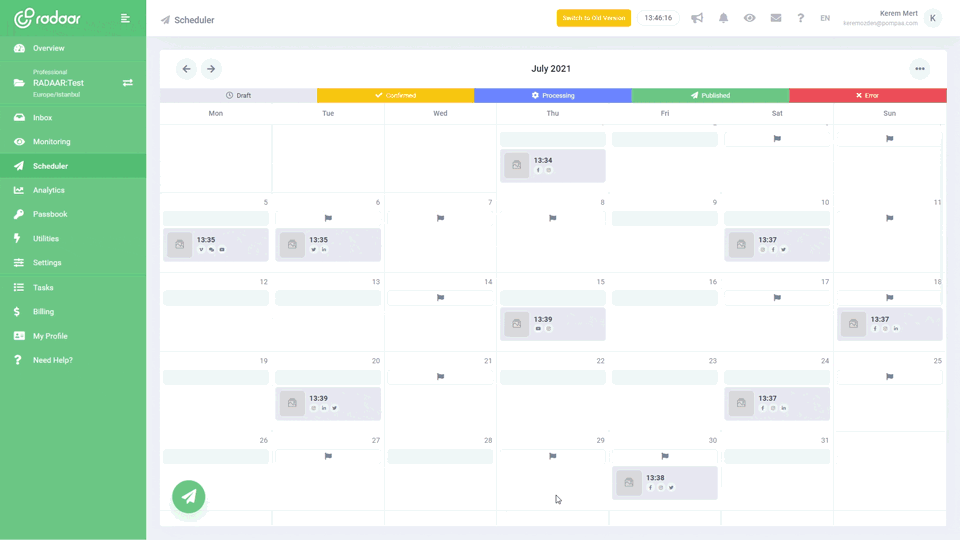How can a free real estate social media strategy template take your business to the next level?
Unlock the potential of your real estate business with our comprehensive free social media strategy template, designed to elevate your online presence and boost client engagement. Discover actionable insights and step-by-step guidance in this blog post to transform your marketing efforts and drive growth—dive in to learn more!
LEARN MORE LAUNCH DEMO NOW In today's digital era, having a strong online presence isn't just beneficial for real estate professionals—it's essential. With an ever-growing number of homebuyers and renters turning to social media platforms for their next move, harnessing the potential of these networks can significantly boost your business. However, crafting a successful social media strategy can seem daunting without a structured plan in place. That's where a free real estate social media strategy template comes into play, offering a streamlined approach to help you navigate the digital landscape effectively.
By utilizing a well-crafted social media strategy template, you can ensure consistency in your communications, maintain a professional image, and engage more effectively with your audience. This tool can guide you in identifying the right platforms to target, crafting compelling content, and scheduling posts to optimize engagement. Furthermore, a template can save you time and resources, allowing you to focus on what you do best—connecting clients with their dream homes. Discover how leveraging a free real estate social media strategy template can elevate your business and keep you ahead in the competitive real estate market.
By utilizing a well-crafted social media strategy template, you can ensure consistency in your communications, maintain a professional image, and engage more effectively with your audience. This tool can guide you in identifying the right platforms to target, crafting compelling content, and scheduling posts to optimize engagement. Furthermore, a template can save you time and resources, allowing you to focus on what you do best—connecting clients with their dream homes. Discover how leveraging a free real estate social media strategy template can elevate your business and keep you ahead in the competitive real estate market.
Table of Contents
- What does a real estate social media strategy accomplish?
- How to tailor the strategy to your target audience?
- Why is content creation critical in this strategy?
- Which social media platforms are best for real estate?
- How to measure success in your social media strategy?
- What role does engagement play in this strategy?
- How to manage your time effectively with this template?
- What should you look out for when using this template?
- Ready to elevate your real estate business with a winning social media strategy?
What does a real estate social media strategy accomplish?
A real estate social media strategy serves as a roadmap for establishing a dynamic online presence, allowing real estate professionals to expand their reach and engage with a broader audience. By clearly defining goals, target audience, and content types, it ensures that all social media efforts are aligned to effectively generate leads and build solid relationships with potential clients. Moreover, a well-crafted strategy helps in showcasing properties through visually appealing content and storytelling, offering a personal touch that resonates with home buyers and sellers alike. Ultimately, it positions the business as an authority in the real estate market, fostering trust and loyalty among clients.
How to tailor the strategy to your target audience?
To effectively tailor your real estate social media strategy to your target audience, it's crucial to first understand who they are. Begin by identifying key demographics such as age, location, and average income, which can help refine your approach and messaging. Delve into your audience’s interests, lifestyle preferences, and common challenges they face in the real estate market. Utilizing tools like surveys or social media analytics can provide valuable insights into their behaviors and preferences, enabling you to craft content that resonates.
Once you've gathered this information, customize your content so it specifically addresses your audience’s needs and concerns. For example, if your target audience comprises first-time buyers, focus on sharing educational content about the buying process, mortgage options, and home maintenance tips. Use a conversational tone and relatable language to make the posts more engaging and approachable. Additionally, consider the platforms where your audience is most active; millennials might be more present on Instagram, while older generations may prefer Facebook. By aligning your strategy with the platforms and content types your audience prefers, you increase engagement and build stronger connections with potential clients.
Once you've gathered this information, customize your content so it specifically addresses your audience’s needs and concerns. For example, if your target audience comprises first-time buyers, focus on sharing educational content about the buying process, mortgage options, and home maintenance tips. Use a conversational tone and relatable language to make the posts more engaging and approachable. Additionally, consider the platforms where your audience is most active; millennials might be more present on Instagram, while older generations may prefer Facebook. By aligning your strategy with the platforms and content types your audience prefers, you increase engagement and build stronger connections with potential clients.
Why is content creation critical in this strategy?
Content creation is essential in a real estate social media strategy because it helps showcase your expertise, engage potential clients, and build trust within the community. By consistently sharing valuable, engaging, and visually appealing content, you can make your brand memorable and position yourself as an authority in the real estate market. Moreover, creative content like virtual tours, testimonials, and market updates can spark curiosity and drive organic growth. With a solid flow of quality content, you can escalate conversations, foster relationships, and ultimately boost your business development efforts.
Which social media platforms are best for real estate?
When it comes to promoting your real estate business through social media, choosing the right platforms can make a significant difference in your success. Facebook remains a top choice due to its expansive reach and robust advertising options, allowing real estate agents to target potential clients based on location, interests, and demographics. Instagram, with its highly visual nature, is perfect for showcasing stunning property images and engaging with a younger audience, especially through Instagram Stories and Reels that bring listings to life. LinkedIn is another essential platform, particularly for building professional connections and sharing industry insights that can establish you as a knowledgeable expert in real estate.
Platforms like YouTube are equally powerful, offering a dynamic way to present virtual tours and market updates through engaging video content, which can also boost search engine optimization. Twitter may not be the first platform that comes to mind, but it is effective for sharing real-time updates, interacting with local communities, and participating in conversations about real estate trends. Pinterest is an underutilized tool where beautiful photos can drive traffic back to your listing pages or blog posts. By strategically incorporating these platforms into your social media strategy, you can effectively reach a wider audience and elevate your real estate business to new heights.
Platforms like YouTube are equally powerful, offering a dynamic way to present virtual tours and market updates through engaging video content, which can also boost search engine optimization. Twitter may not be the first platform that comes to mind, but it is effective for sharing real-time updates, interacting with local communities, and participating in conversations about real estate trends. Pinterest is an underutilized tool where beautiful photos can drive traffic back to your listing pages or blog posts. By strategically incorporating these platforms into your social media strategy, you can effectively reach a wider audience and elevate your real estate business to new heights.
How to measure success in your social media strategy?
Measuring the success of your real estate social media strategy involves tracking both quantitative and qualitative metrics to ensure your efforts are driving meaningful results. Start by paying attention to key performance indicators (KPIs) like engagement rates, which encompass likes, shares, and comments. These metrics reveal how well your content resonates with your audience and can indicate the potential for organic reach and virality. Additionally, tracking follower growth over time can provide insights into how effectively your strategy attracts new potential clients or partners interested in your real estate services.
Beyond numbers, it's equally important to monitor qualitative aspects such as the tone and quality of interactions with your audience. Analyze the sentiment of comments and messages to understand the general perception of your brand among your followers. Social media tools often provide dashboards that offer these insights, but regularly interacting with your audience can provide firsthand knowledge of their needs and interests. Finally, make sure to align your social media goals with broader business objectives, such as driving traffic to your website or generating leads, and evaluate how well social media contributes to these goals. By aligning your strategy with clear objectives and consistently tracking these metrics, you can iteratively refine your approach and thereby enhance the impact of your social media presence on your real estate business.
Beyond numbers, it's equally important to monitor qualitative aspects such as the tone and quality of interactions with your audience. Analyze the sentiment of comments and messages to understand the general perception of your brand among your followers. Social media tools often provide dashboards that offer these insights, but regularly interacting with your audience can provide firsthand knowledge of their needs and interests. Finally, make sure to align your social media goals with broader business objectives, such as driving traffic to your website or generating leads, and evaluate how well social media contributes to these goals. By aligning your strategy with clear objectives and consistently tracking these metrics, you can iteratively refine your approach and thereby enhance the impact of your social media presence on your real estate business.
What role does engagement play in this strategy?
Engagement is the lifeblood of any successful social media strategy, especially in real estate. By actively engaging with your audience through comments, shares, and likes, you build a community that trusts your expertise and values your input, making them more likely to become clients. Responding promptly to questions and participating in conversations not only increases your visibility but also helps establish a solid reputation, turning potential leads into loyal followers. With a vibrant and interactive presence, your real estate brand can achieve exponential growth, attracting more clients and multiplying opportunities for success.
How to manage your time effectively with this template?
Managing your time effectively becomes a breeze with a real estate social media strategy template. By having a predefined structure, you can focus on creating engaging content rather than getting bogged down in planning each detail from scratch. This template allows you to allocate specific time slots for content creation, engagement, and analysis, ensuring that you cover all your social media bases without wasting precious time. Prioritizing tasks and setting clear deadlines will maximize your productivity, allowing you to grow your online presence efficiently.
What should you look out for when using this template?
When using a free real estate social media strategy template, it's important to ensure it aligns with your brand's unique voice and goals. Be mindful of any sections that might need customization to resonate with your target audience, such as local market insights or specific property highlights. Avoid overusing the template’s default language as it might not fully capture the distinct personality of your business. Lastly, regularly review and adapt your strategy as the real estate market and social media trends evolve to keep your content engaging and relevant.
Ready to elevate your real estate business with a winning social media strategy?
Elevating your real estate business with a strategic social media approach is no longer optional—it's essential. By leveraging a free real estate social media strategy template, you can effectively organize your efforts, ensuring that every post, story, and engagement activity is aligned with your business goals. This template will guide your journey from crafting compelling content to targeting the right audience, maximizing your online presence. The right template not only saves you time but also provides a framework to consistently connect with potential clients, turning followers into loyal customers.
Remember, the power of social media lies in its ability to transform casual viewers into active participants in your business journey. By investing in a well-thought-out strategy, you'll enhance your brand visibility and credibility in a competitive market. With consistent effort and the right tools, your real estate business can thrive in the digital age. Embrace the potential of social media today, and watch as your business reaches new heights.
Remember, the power of social media lies in its ability to transform casual viewers into active participants in your business journey. By investing in a well-thought-out strategy, you'll enhance your brand visibility and credibility in a competitive market. With consistent effort and the right tools, your real estate business can thrive in the digital age. Embrace the potential of social media today, and watch as your business reaches new heights.
SOCIAL MEDIA SCHEDULER
Plan and publish...
Plan and publish your content for Facebook, Instagram, Twitter, and LinkedIn from one simple dashboard.
LEARN MORE FREQUENTLY ASKED QUESTIONS
What is social media management platform?
RELATED BLOG POSTS
All the tips & tricks you'll need...
Get the fresh tips and tricks you'll need to ace social media marketing.











